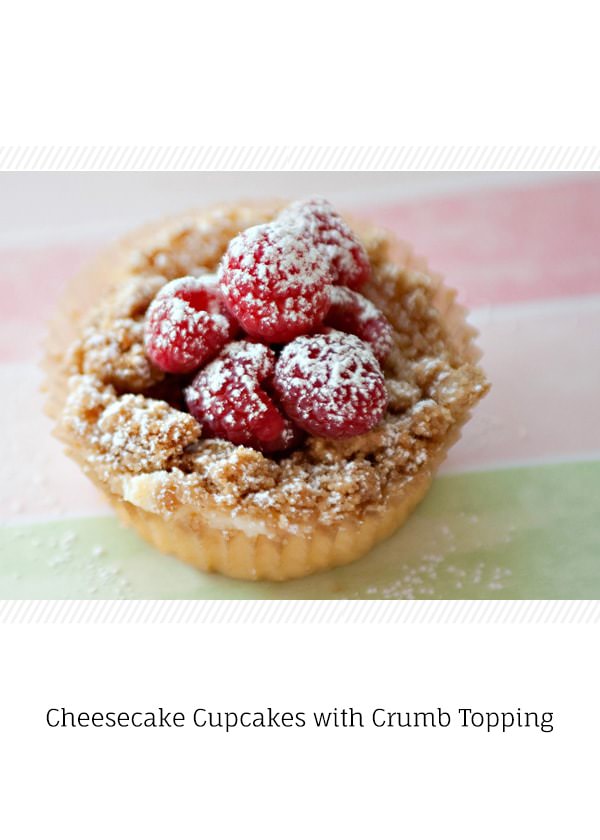Fry up Potato Pancakes in the morning and have your entire family flocking to the kitchen for a bite of these morsels of spud-tacular taste.
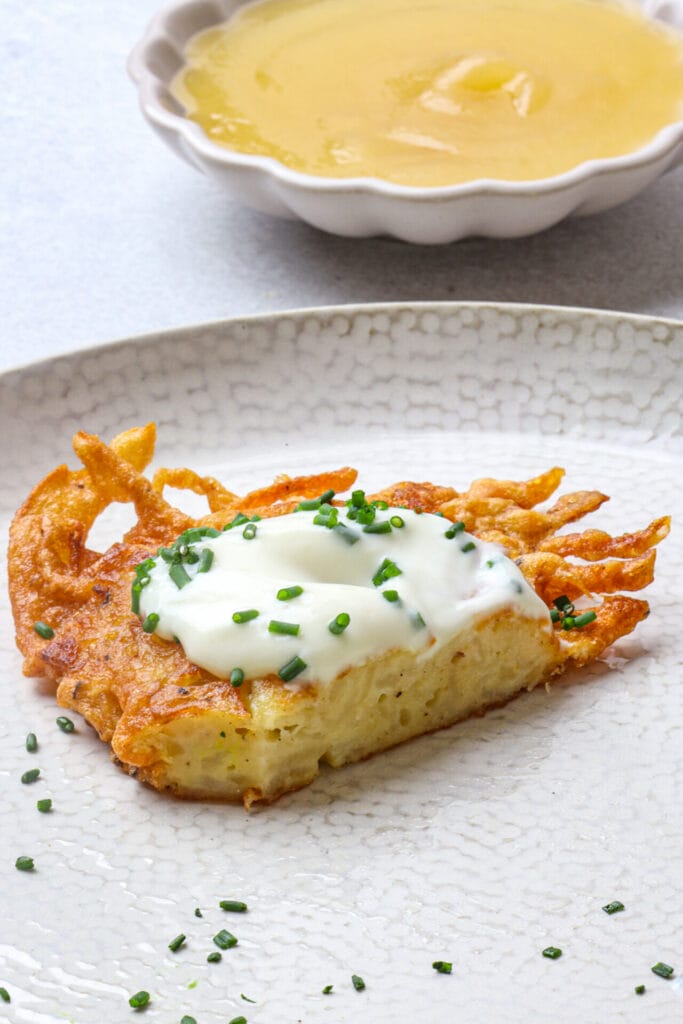
Who needs an alarm clock to get the family out of bed in the morning when you’ve got these Potato Pancakes! One whiff of these and it’s “See you later, Mr. Sandman! I’m off to the kitchen!”
I realized this a few years back. While I do love my pancakes, I was looking for a way to change things up a bit. Usually, I would switch up the toppings—add a fruit here, sprinkle on some sugar there—but this time, I wanted to change up the pancakes themselves. They needed something… but what? Then I saw a recipe for a Kartoffelpuffer (which, incidentally, is a really fun word to say). That’s what Germans call a potato pancake. I was inspired.
I made some changes from the recipe I originally saw but the essence is still there. The great thing is, you don’t have to wait till Oktoberfest to make these Teutonic delicacies. My family have embraced them and now are a part of our Saturday morning breakfast routine as bacon and eggs (and mimosas for me!).
What’s the Difference Between Potato Pancakes and Latkes?
I don’t blame you for thinking the two are one and the same. There are differences, though, starting with where they come from. Potato pancakes (or Kartoffelpuffers) are German in origin, whereas latkes are a Jewish delicacy long associated with Hanukkah (due in part to the vital role oil plays both in the holiday and latkes). They used to be made with buckwheat flour and fried in chicken fat but eventually adopted potato as the main ingredient as potatoes grew in popularity throughout Eastern Europe. Their textures are also different, with pancakes having a creamier center, thanks to the fineness of the shredded potato, whereas latkes have a consistency more comparable to hash browns. As for what they’re made of, the latke uses matzo meal and baking powder to keep its shape, while the potato pancake is made from simpler stuff. I’ve added a few extra ingredients, mind you, so think of these are deluxe potato pancakes!
Ingredients
- 4 cups russet potatoes, peeled and grated (about 4 medium-sized potatoes)
- 2 large eggs, beaten
- 4 tbsp all-purpose flour
- 2 tsp kosher salt (plus extra for seasoning)
- 1 tsp onion powder
- 1/4 tsp freshly ground black pepper
- 3 tbsp vegetable oil
- Greek yogurt or sour cream (for serving)
- applesauce (for serving)
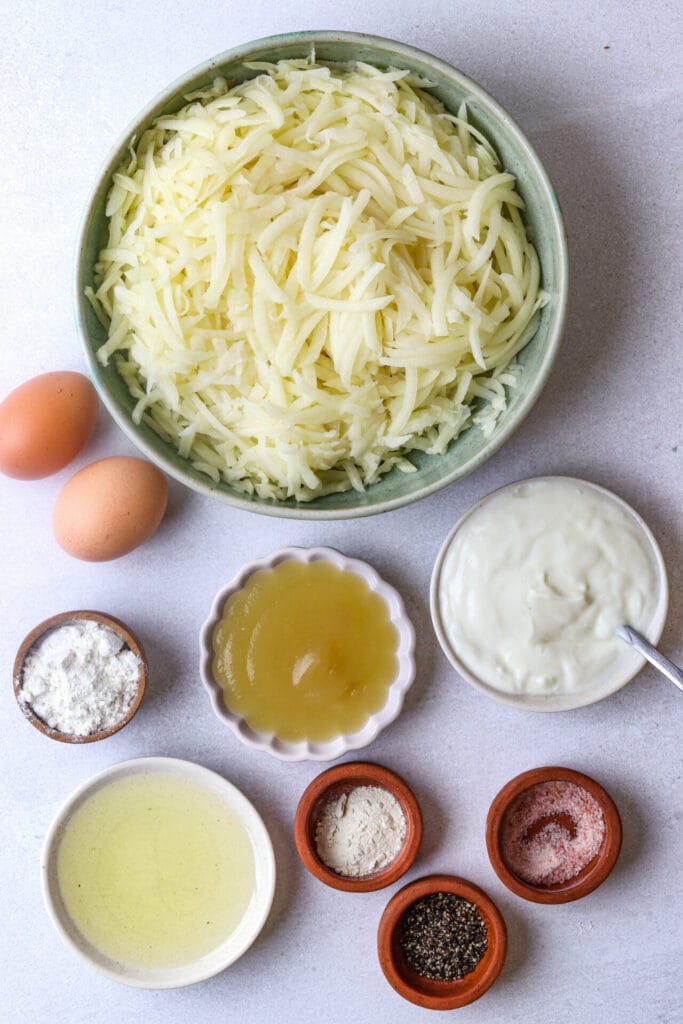
How to Make Potato Pancakes
Step 1: Preheat your oven to 300°F. Place a wire rack over a baking sheet and set it aside.
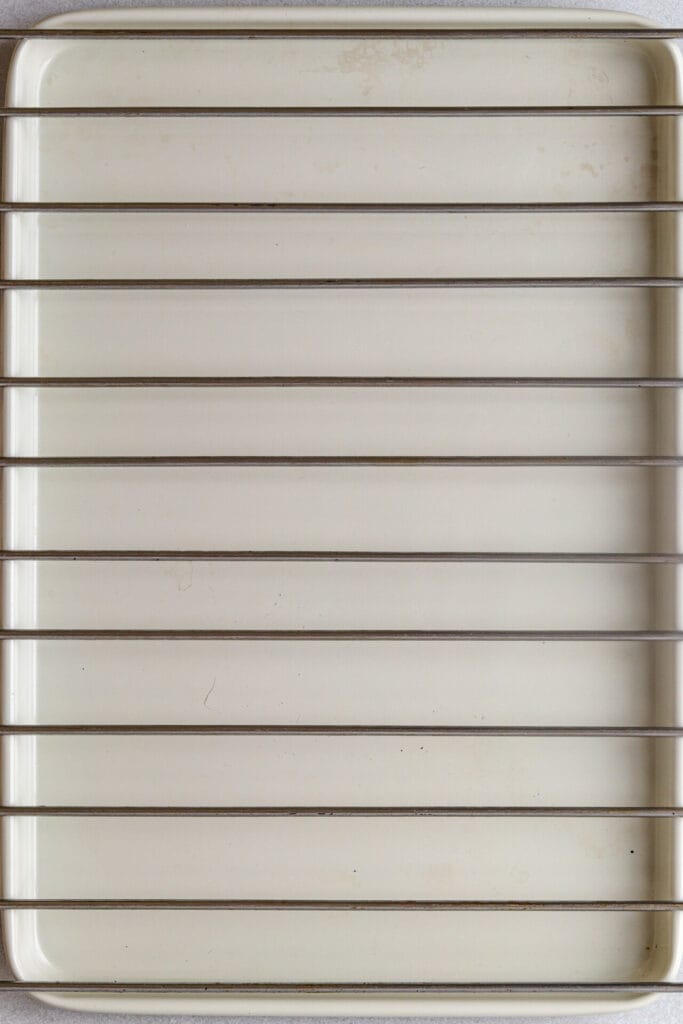
Step 2: Grate the potatoes and put them in a clean kitchen towel. Twist and squeeze over the sink to remove as much moisture as possible.
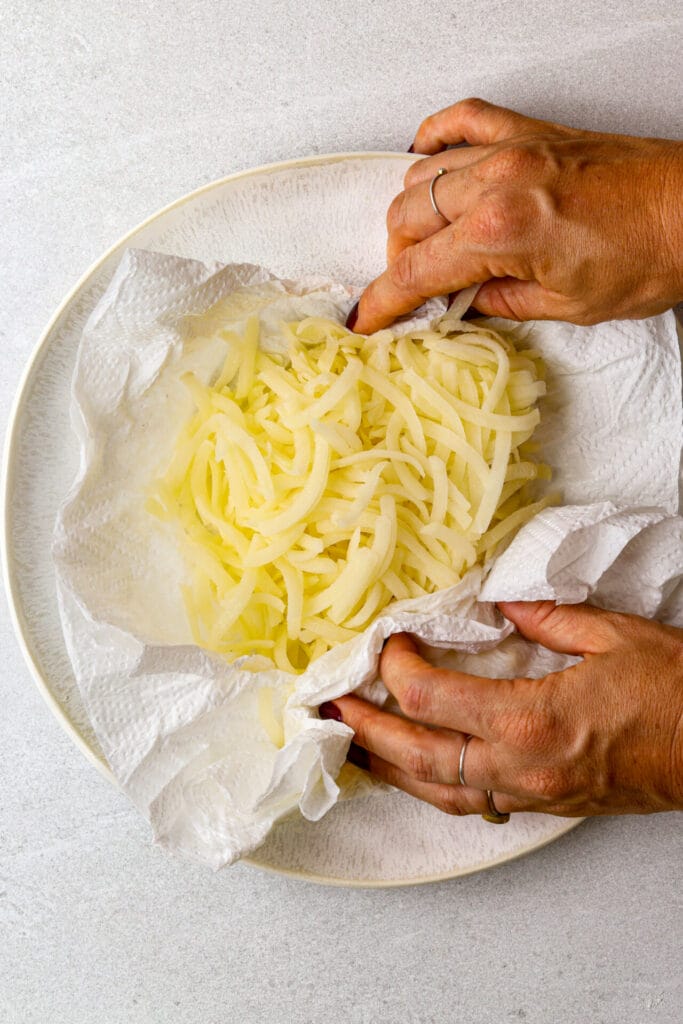
Step 3: In a large mixing bowl, whisk the eggs until frothy. Sprinkle in the flour, 2 teaspoons of salt, onion powder, and black pepper. Stir until the mixture is well combined and there are no dry spots. It’s OK if the batter is a bit lumpy.
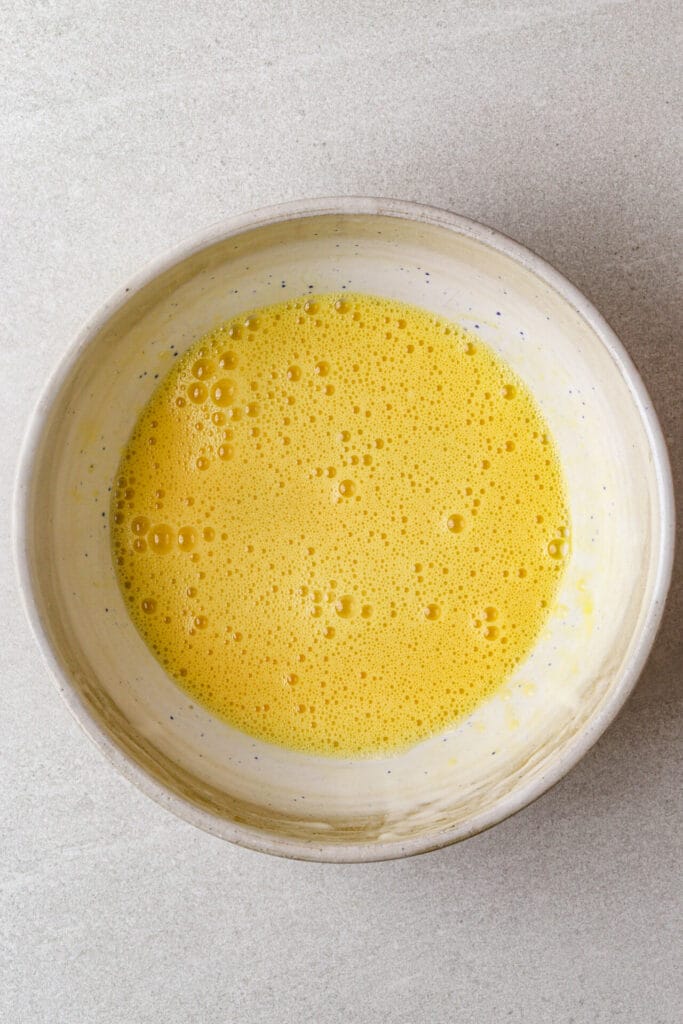
Step 4: Add the grated potatoes to the egg mixture. Gently fold everything together until the potatoes are well coated. The batter should be thick. If it’s too runny, sprinkle in a bit more flour.
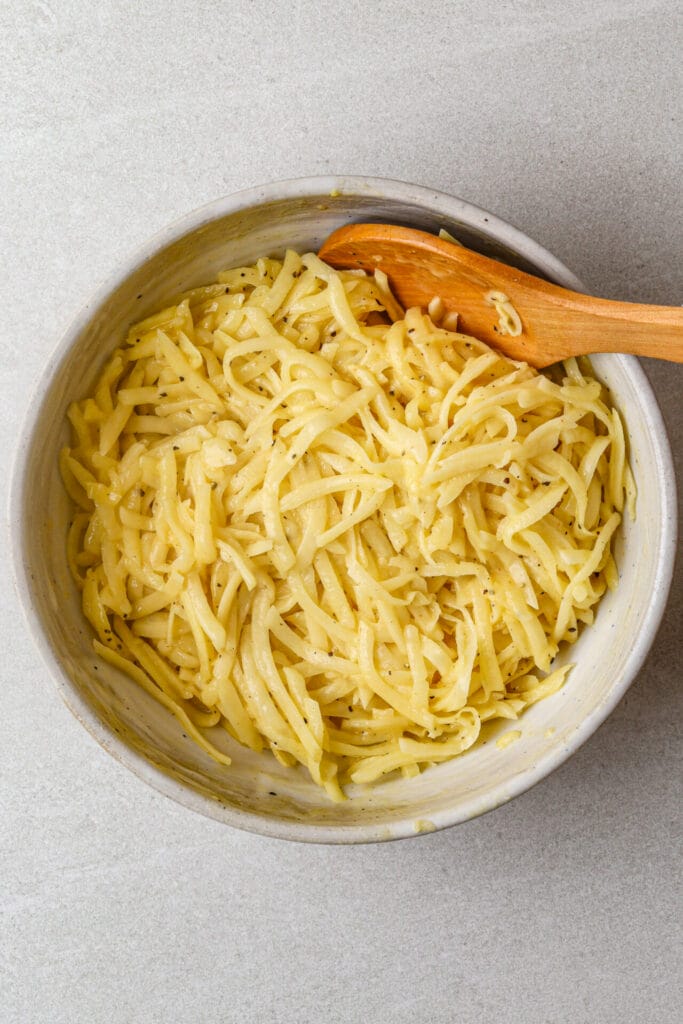
Step 5: Heat the vegetable oil in a large skillet over MED-HIGH heat. Test the heat by dropping a small bit of batter in. If it sizzles immediately, it’s ready.
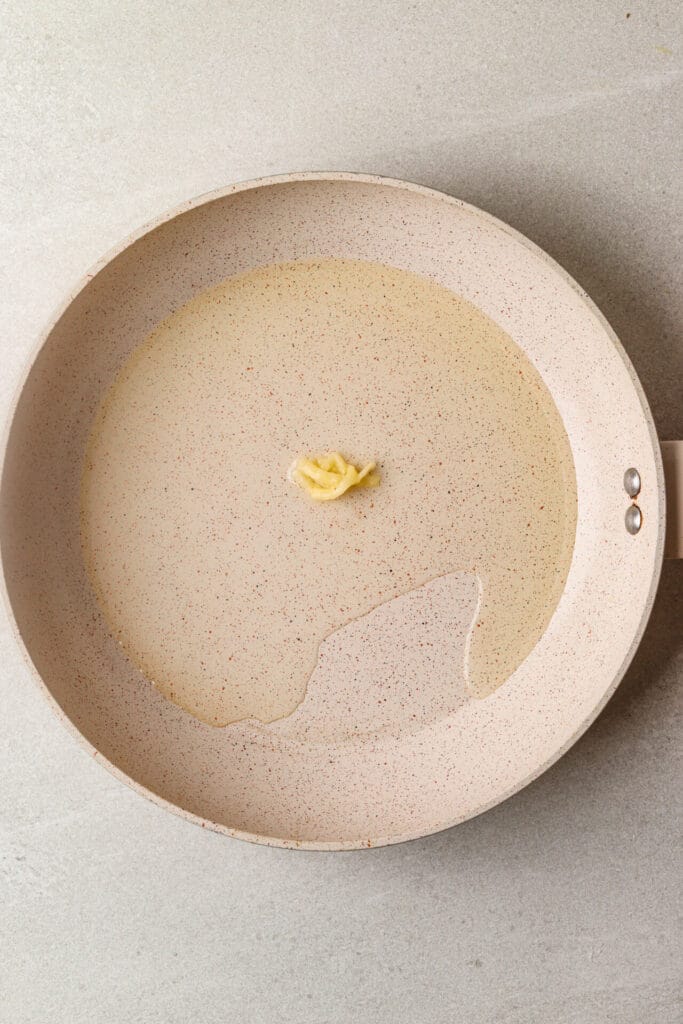
Step 6: Scoop 1/4 cup portions of the potato mixture into the hot oil. Flatten them slightly to form pancakes. Cook without crowding the pan, about 3 minutes a side. They need to be golden brown and crispy. Reduce the heat if the oil smokes.
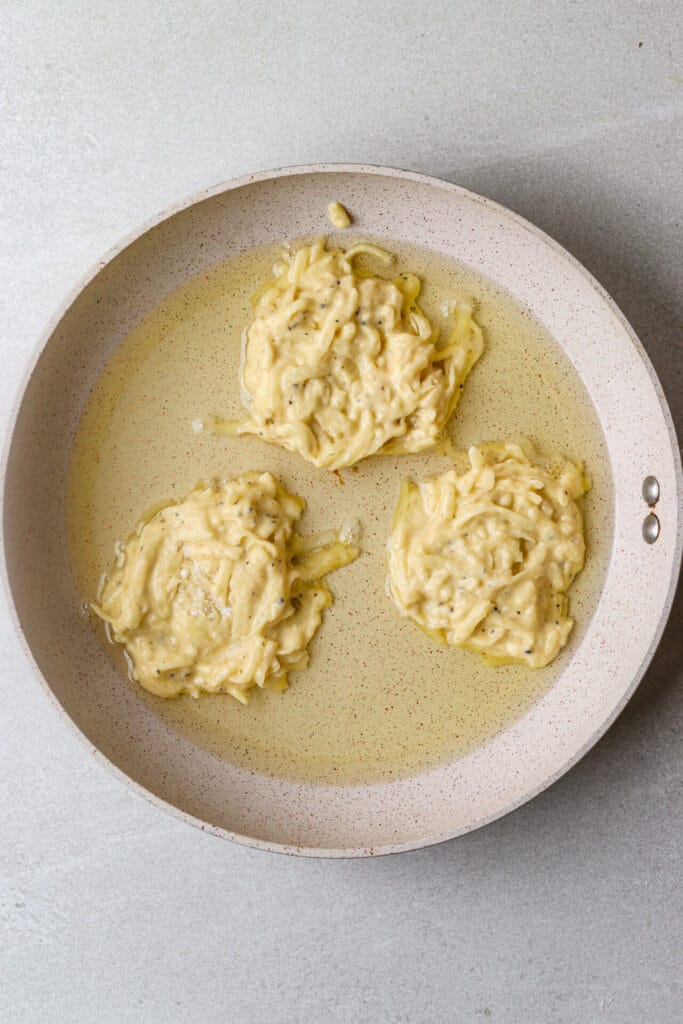
Step 7: Transfer the cooked pancakes to the prepared wire rack. Sprinkle with a touch of salt and keep them in the oven to stay warm.
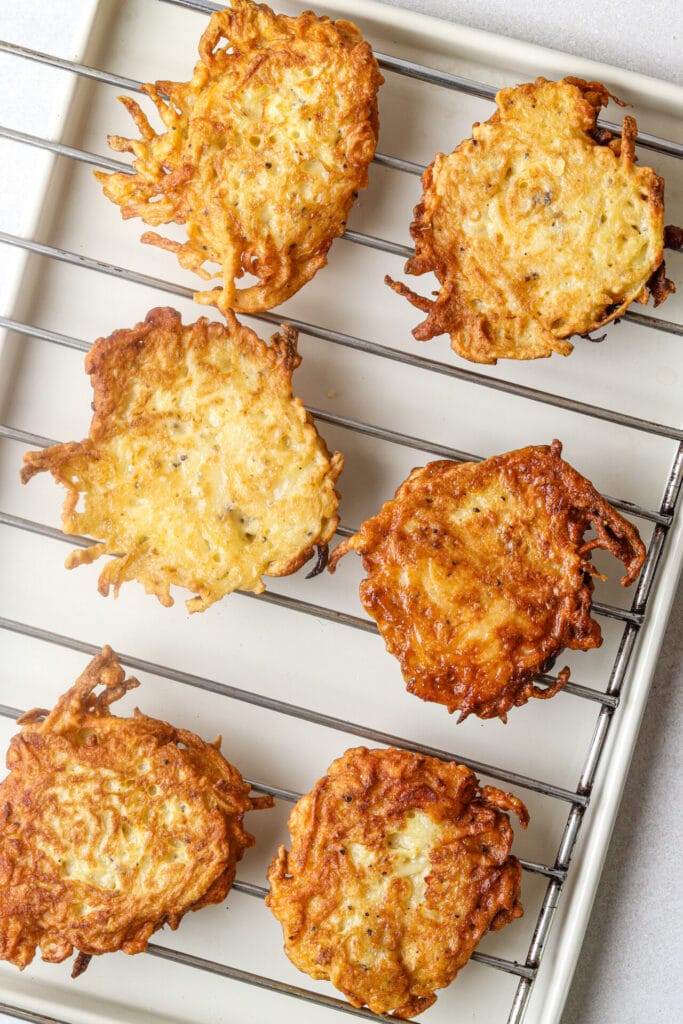
Step 8: Once all the pancakes are cooked, serve them hot with a side of Greek yogurt or sour cream and applesauce.
FAQs & Tips
Let the pancakes cool completely. Use a paper towel to soak up any excess oil then wrap each one in plastic or aluminum. You can also add them to an airtight container, though I recommend laying them out in a single layer so they don’t stick together. They should keep in the fridge for up to 3 days. You can also freeze them. Just wrap each individually then store them in an airtight container first. They should keep for up to 2 months. Let them thaw overnight in the fridge then reheat in the oven at 350°F on a large baking pan.
Sure, it’s quick and convenient. But if you have the time, might I recommend my homemade Spiced Vanilla Applesauce? The spices and vanilla may not work with the potato pancakes, so you might want to omit them from the recipe. I’ll let you decide.
If you’re having difficulty making a cohesive pancake, there may be too much moisture in your potato mix. Aggressively squeeze the shredded potato to rid as much moisture as possible and dry them out. Otherwise, you may need to add more flour, which will absorb that moisture and help the pancakes stay together.
Russets are high in starch and low in moisture, making them ideal potatoes for pancakes. But you can also use Yukon Golds, which will produce fluffy pancakes too. Red potatoes are waxy in texture, so while they will hold their shape well, they may be lacking in the fluffy department.
Apart from applesauce and sour cream/Greek yogurt, serve up some creme fraiche or herbed cream cheese. Want something more substantial (and fancy)? Use smoked salmon and the aforementioned cream cheese. To bring potato pancakes into the 21st century, serve them with avocado slices.
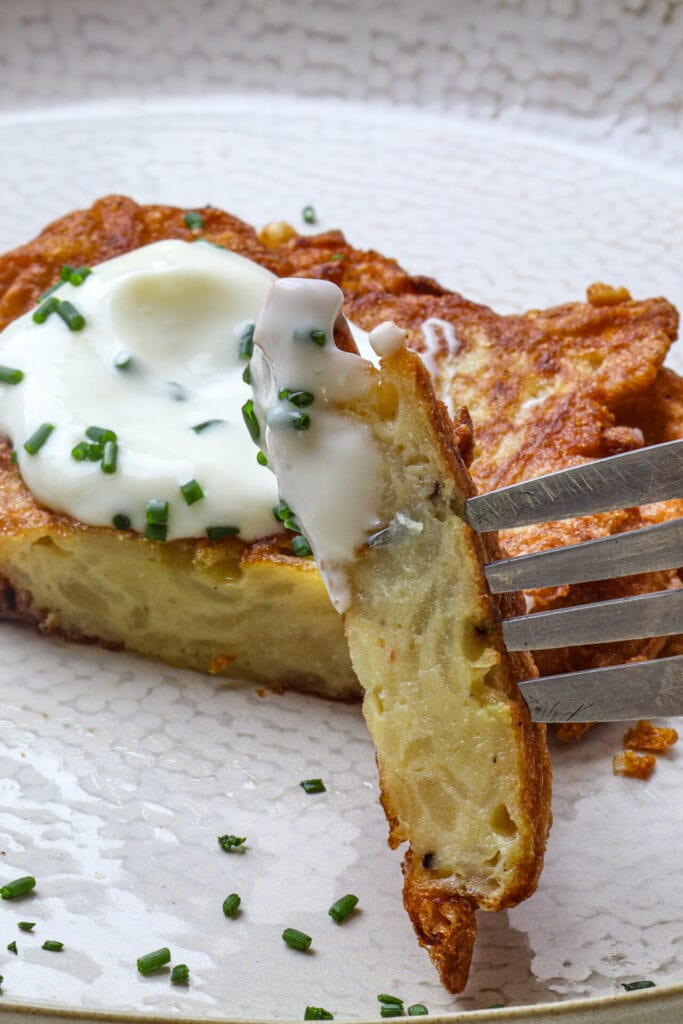
Serving Suggestions
You’ve got potato pancakes as the focal point of your brunch. Now what? Why not parfait the occasion with Chia Seed Pudding with Mango and Blueberry? Feeling the berries? Then you’ll want a batch of my Huckleberry Cafe English Muffins on the side. And if you want the present your guests with a selection of pancakes, Homemade Buttermilk Pancakes must be a part of your menu.
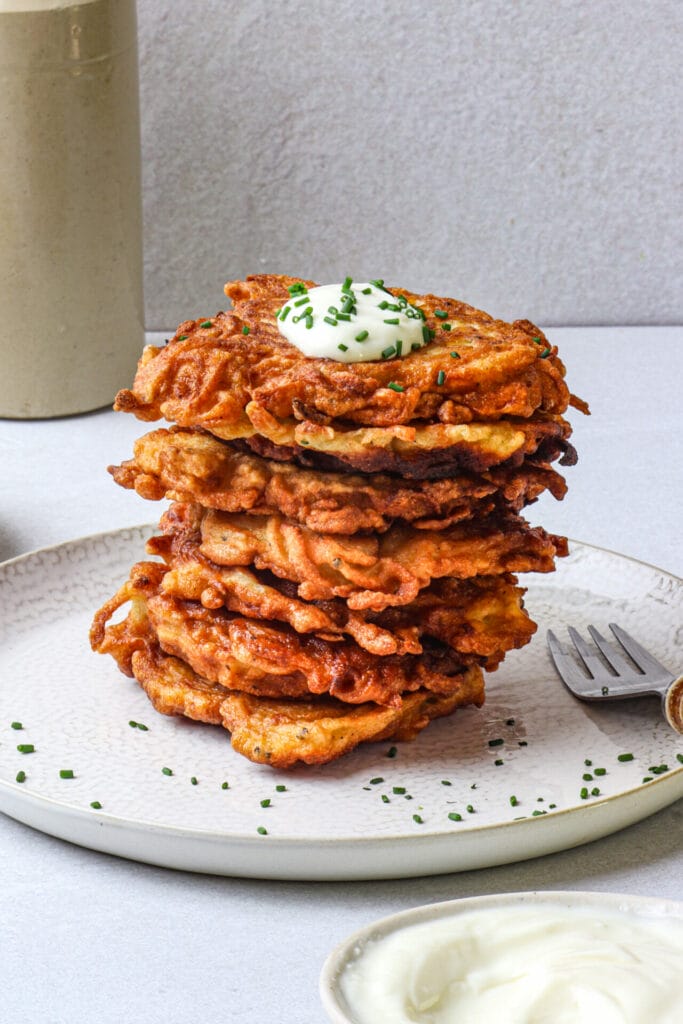
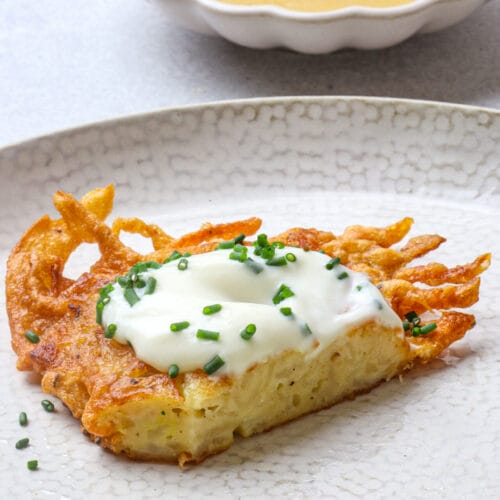
Potato Pancakes
Ingredients
- 4 cups russet potatoes peeled and grated (about 4 medium-sized potatoes)
- 2 large eggs beaten
- 4 tbsp all-purpose flour
- 2 tsp kosher salt plus extra for seasoning
- 1 tsp onion powder
- 1/4 tsp freshly ground black pepper
- 3 tbsp vegetable oil
- Greek yogurt or sour cream for serving
- applesauce for serving
Instructions
- Preheat your oven to 300°F. Place a wire rack over a baking sheet and set it aside.
- Grate the potatoes and put them in a clean kitchen towel. Twist and squeeze over the sink to remove as much moisture as possible.
- In a large mixing bowl, whisk the eggs until frothy. Sprinkle in the flour, 2 teaspoons of salt, onion powder, and black pepper. Stir well until there are no dry spots. It's OK if the batter is a bit lumpy.
- Add the grated potatoes to the egg mixture. Gently fold everything together until the potatoes are well coated. The batter should be thick. If it’s too runny, sprinkle in a bit more flour.
- Heat the vegetable oil in a large skillet over MED-HIGH heat. Test the heat by dropping a small bit of batter in. If it sizzles immediately, it's ready.
- Scoop 1/4-cup portions of the potato mixture into the hot oil. Flatten them slightly to form pancakes. Cook without crowding the pan for about 3 minutes a side. They need to be golden brown and crispy. Reduce the heat if the oil smokes.
- Transfer the cooked pancakes to the prepared wire rack. Sprinkle with a touch of salt and keep them in the oven to stay warm.
- Once all the pancakes are cooked, serve them hot with a side of Greek yogurt or sour cream and applesauce.

